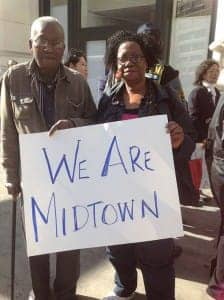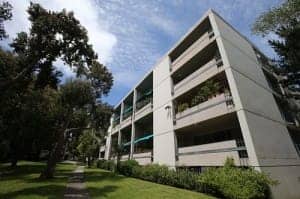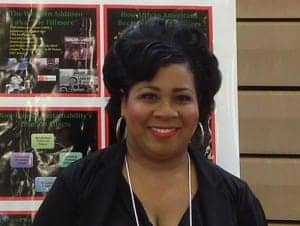by Brightline Defense Project
San Francisco – The cover story of this week’s San Francisco Weekly is the saga of Midtown Park Apartments, a vibrant and diverse 139-unit low- and moderate-income housing community in the Fillmore that survived Redevelopment-era “urban renewal” but that now faces a struggle for its very existence in light of dubious actions and activities by San Francisco Housing Director Olson Lee and his staff. The City, which owns the Midtown property, has neglected to make millions of dollars worth of repairs over the past several decades despite hiring property managers to maintain the property, collect rents and enforce terms of tenancy.

After Director Lee promised last December to increase rents at Midtown in order to pay for these repairs, as well as for a proposed development deal, Lee terminated Midtown’s 40-year-old lease with the City and County of San Francisco just two days before Christmas 2013, according to the San Francisco Examiner. In response, civil rights nonprofit Brightline Defense and legal services provider AIDS Legal Referral Panel (ALRP) joined courageous Midtown resident leaders and nearly 80 Midtown households to file the biggest rent control petition in City history on Feb. 3, 2014.
However, as reported by SF Weekly’s Joe Eskenazi, on April 22 an administrative law judge rejected the resident’s petition, stating that a new lease agreement allegedly signed by the City just days before Midtown filed for rent control and produced by Director Lee on the eve of the April 1 Rent Board hearing, would on its face purport to exempt Midtown from rent control.
ALRP and Brightline pointed out to the judge that the new lease, by its own terms, requires ratification by the mayor and Board of Supervisors in order to be valid and, by the City’s own admission, neither of these ratifications have been obtained. The City replied that its language “was only meaningless ‘boiler plate’” and even after the hearing claimed “clerical error” in seeking to amend its faulty and invalid lease. Nonetheless, the administrative law judge “claimed he didn’t have jurisdiction to determine the validity of this lease” and referred petitioners to the civil court system.
According to this week’s article, SF Weekly relayed the City’s argument to “perhaps a dozen figures throughout San Francisco – lawyers, housing experts, technocrats. The reaction was unanimous: maniacal laughter.”

So on May 7, 2014, residents of Midtown Park Apartments joined ALRP and Brightline to file a Rent Board appeal to the administrative law judge’s confusing April 22 decision. Amidst this ambiguous legal landscape, SF Weekly also reported on the “fanciful notion” that no Midtown residents will be displaced as the commitment to “no displacement” has yet to be offered in writing.
As Midtown’s legal team pointed out, “It is paradoxical to conclude on the one hand that he cannot make a decision on the validity of the lease, while on the other hand concluding that a provision of that very lease renders petitioners’ tenancies exempt from the rent ordinance.”
Such legal maneuvers have occurred against an uncertain policy setting. Indeed, earlier this year, Natacha Yarbrough, a 34-year Midtown resident and current San Francisco State MBA candidate, discovered something drastically different than the publicly disseminated plan for Midtown to raze and replace two buildings and renovate the remaining four. Instead, the “Project Description” listed on the Planning Department website stated all six buildings are to be “removed.”
The Planning Department in January informed Midtown tenants this was also the result of a “clerical error,” a term which has become commonplace with respect to the City’s actions at Midtown. Yet SF Weekly reports that recent emails exchanged between the City and a development consultant openly contemplate the possibility of demolishing three or even four buildings. Future rent increases remain undetermined as well.

Midtown, a diverse and resilient community of working class families and seniors of color that survived the wave of Redevelopment Agency urban renewal that decimated their neighborhood in the 1960s and 1970s, is in many ways emblematic of the struggle many San Franciscans face to remain in San Francisco during the escalating affordability crisis.
Midtown has endured while the residents methodically paid off the City’s mortgage for land and buildings they did not own and in which they held no equity. In an arrangement originally intended to be a limited equity co-op, Midtown residents remain renters, not owners, while the City holds free and clear title to a highly valuable property in what the Weekly calls “an increasingly opulent San Francisco enclave.”
Midtown has attracted a diverse coalition of supporters under the banner “We Are Midtown,” despite demonization by Director Lee and some City staff, an unclear level of traditional political support and a hands-off approach by most City-funded housing and tenants’ rights nonprofit groups. Midtown and its inspiring residents and resident leaders have survived these types of obstacles in the past, however, and Midtown will endure these newest challenges as well.
Justice is on Midtown’s side.
Brightline Defense Project can be reached at 1028A Howard St., San Francisco, CA 94103, (415) 252-9700, frontdesk@brightlinedefense.org, www.brightlinedefense.org. Brightline is a non-profit policy advocacy organization dedicated to protecting and empowering communities. Brightline’s efforts have included campaigns to shut down dirty fossil fuel power plants in Southeast San Francisco, promote renewable energy and efficiency at the local, regional and state levels, and develop local hiring policies and community workforce agreements to increase blue-collar and green-collar employment opportunities for residents of the Bay Area’s economically disadvantaged neighborhoods and environmental justice communities.





